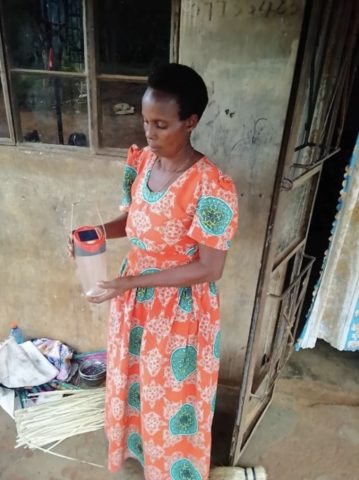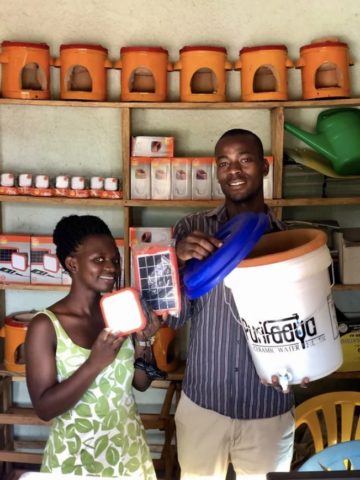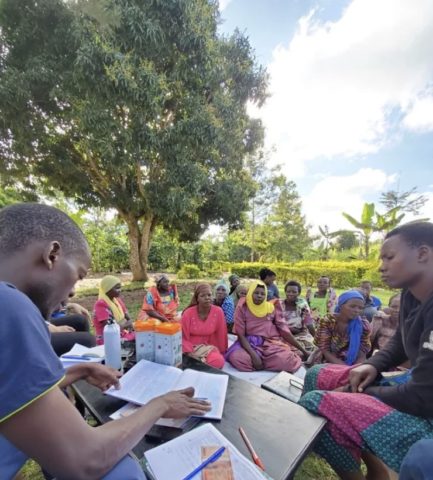Nestled within the budding town of Mayuge, Uganda, Annet Kyomugisha was used to spending UGX 1,000 per day ($8 per month) to buy kerosene lamps as a source of light for her home. In the district of Mayuge, this is about 15% of a family’s monthly income, but options are limited – 78% ofUganda’s population lacks access to electricity and 53% relies on kerosene lamps for light.

Kerosene lamps are not only inefficient and
expensive but dangerous because of the toxic fumes.Annet was also having a hard time in the evenings, the poor-quality light provided by kerosene lamps didn’t allow her children to do any homework or reading after sunset, so she took matters into her own hands. Through a “rent-to-own” model by Pearl Entrepreneurs Academy (PEA), Annet bought her first solar lantern. She is now the proud owner of two solar lanterns – one inside her home and another in the outdoor kitchen area.
Annet’s transition from traditional fossil fuels to clean energy has changed her life forever. By eliminating a high monthly cash expense, she is now able to save money. Even during a pandemic, the sun is free, charging a lantern has no cost. Annet can now take care of her children and feel safe because her family has light after sunset, a luxury many of us are used to.
An entrepreneur with a clean mission
Annet’s story really begins with Elvis Kadhama, the 27-year-old founder and Executive Director of PEA. Pearl Entrepreneurs Academy is a youth-led community-based organization that is committed to ending hunger by boosting crop yields and improving food security and creating jobs. PEA offers smart farming practices to low-income households in urban and rural areas, so communities can grow crops and obtain a source of income from the project. PEA is committed to setting up distribution chains for decentralized energy access and educating people about clean energy while distributing products like solar lanterns, ceramic water filters, and low emission cookstoves. Currently, PEA’s flagship projects have been selling organic farm input (vegetable seeds, fertilizers, pesticides, etc.) and household clean energy products like Annet’s solar lanterns.
Elvis traces his founding journey from his humble beginnings in the town of Mayuge, where he saw the need to solve hunger in his community and look after his family when his parents couldn’t afford to do so on their own. After completing his diploma in business, Elvis was among the lucky few to get a job as a credit officer in microfinance earning $100 per month. He realized quickly this was not sustainable and that’s when the birth of a business idea started brewing, “My turning point was because of the low paying job and a need to uplift and inspire my siblings,” says the entrepreneur.
Pearl Entrepreneurs Academy is emerging as a model social business combining entrepreneurship with community social service in the last mile (low-income communities). Civil societies in Uganda are a crucial avenue for economic development and entrepreneurship. Coined by Muhammed Yunis, the term social business refers to a busine
ss with a social mission at its core – 100% dedicated to solving human problems. Today, developing countries in an effort to achieve economic growth, are steadfast on stimulating an environment that encourages businesses in the last mile. The biggest challenge of all is access to energy.
Pearl Entrepreneurs Academy is emerging as a model social business combining entrepreneurship with community social service in the last mile (low-income communities). Civil societies in Uganda are a crucial avenue for economic developmentand entrepreneurship. Coined by Muhammed Yunis, the term social business refers to a business with a social mission at its core – 100% dedicated to solving human problems. Today, developing countries in an effort to achieve economic growth, are steadfast on stimulating an environment that encourages businesses in the last mile. The biggest challenge of all is access to energy.

Like many sub-Saharan countries, the overwhelming majority of Uganda’s population has no access to electricity and resides in rural areas that require off-grid solutions. Rural Uganda relies on subsistence farming, mostly manual in nature and dependent upon unpredictable climatic patterns posing a challenge of low yield in prolonged dry spells.
The ENVenture program, under the Ugandan chapter of New Energy Nexus, was created to help provide clean energy access for all. The program incubates and accelerates clean energy businesses through loan financing and capacity building. Since 2016, 97 Community Based Organizations (CBOs) have become part of the program and PEA is one of them. The world as we know it is going through a global pandemic and CBOs are no exception to COVID’s negative consequences. Survey results from the CBOs show that the lockdown and order of business closure has limited sales to almost zero. In PEA’s case, COVID-19 has affected business because of the nature of projects that require community gathering.
Clean energy products are affordable for all
Pearl Entrepreneurs Academy runs an eco-inclusive social enterprise to improve rural livelihoods. Elvis describes the “Academy” part of his organization’s name, as a platform through which he helps people become business owners and trains communities on how to save, obtain a loan, and invest. PEA is proactive, they reach out to communities and organize people into Village Savings and Loans Associations (VSLAs) with support from the local government. VSLAs are local, self-managed groups of people that help even the poorest households manage their money more efficiently and stay out of debt. Elvis attributes his VSLA effort to his mother who used her savings to put him through university.
PEA has two co-founders and four employees and it has formed 15 VSLA groups, with each group consisting of 30 members or more, all within Elvis’ home district of Mayuge. VSLA members join voluntarily, the criterion is to pay a one-time subscription fee of UGX 6,000 ($2) for a savings passbook, free training in financial literacy, receiving farm inputs, and clean energy products on credit through their innovative “rent-to-own” financial model.
PEA’s clean energy section of the business was launched through a partnership with ENVenture in December 2018. Elvis took part in a three-day triannual workshop that equips CBOs with empowering entrepreneurial skills. He accredits some of PEA’s successes to the ENVenture sponsored business development fellow, Erik Lower, a volunteer and university student from Germany. Erik and Elvis designed PEA’s distribution model and financial management structures, both of which are still used today.

The distribution model recruits local women and “solarpreneurs”, who sell assigned stock door todoor for a commission at instalment terms favourable to the customer. Within the VSLAs, members are provided with a flexible payment model that allows a “rent-to-own” scheme for solar and improved cookstoves.
Annet took advantage of this scheme, which has increased her savings in addition to giving her family access to clean energy.
To date, PEA has sold over 450 solar lanterns and 275 cookstoves.
From clean energy to health: Elvis invents mosquito repellent soap to fight Malaria.
After the creation of the clean energy business, Elvis had another idea. To use his profits and create another social enterprise that produces mosquito repellent bath soap to fight malaria (the effects last up to six hours). According to Uganda’s Ministry of Health, Malaria is a major public health problem that slows socio-economic development and is the leading cause of morbidity and mortality. In 2016, Elvis’ brother died of Malaria, “I thought of everyday products used by everyone and accessible at an affordable price,” says Elvis. The soap business is now registered as Eco Organic Innovations Ltd and is a social enterprise under PEA. To date, they have distributed over 1,000 free units and sold 1,500 units. This number could grow, but the limited capital only enables small scale production and money made during distribution is reinvested back into the business.
Like many entrepreneurs, Elvis is always coming up with ways to scale his businesses and create more impact in his community, “I lie awake at night always thinking of innovations I can achieve”. Elvis committed to empowering 100,000 rural households with clean energy products and mosquito repellent products in Uganda by 2030.
Who is Elvis Kadhama?
Elvis is the firstborn of 8 children, a 27-year-old Ugandan social entrepreneur passionate about catalyzing the health and clean energy transition in rural Uganda. He’s a graduate from Uganda College of Commerce Tororo in 2015 with a Business diploma. He has 4 years of experience in social business management and is the co-founder and Executive Director of Pearl Entrepreneurs Academy and Eco Organic Innovations limited. Elvis is an alumnus of the Young African Leadership Initiative-YALI RLC EA (2018) and Bridges for Enterprise USA, he’s also a Grow Movement Fellow (2018). He believes the role of health innovation and clean energy products have in improving individual livelihoods and sustainability. Hence, he’s committed to empowering 100,000 rural households with clean energy products and mosquito repellent products in Uganda by 2030.
Contact info
Email: kadamaelvis@gmail.com
Facebook: https://www.facebook.com/pearlentrepreneursacademy/
Website: https://peauganda.wordpress.com/